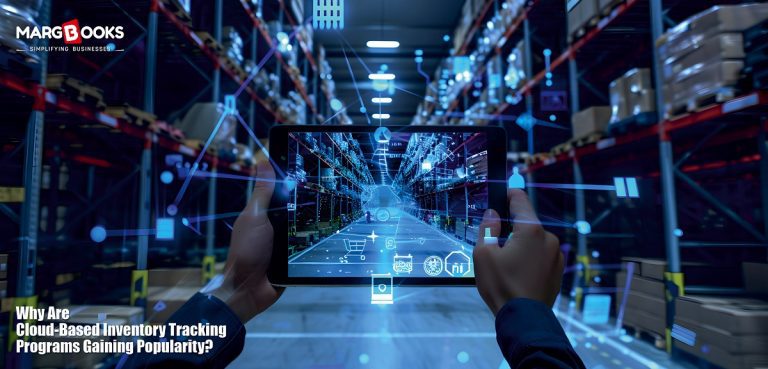If you’re managing inventory efficiently, it is crucial to ensure smooth operations and timely deliveries. Gone are the days when businesses relied solely on manual methods or outdated software to track inventory. The shift towards cloud-based inventory tracking programs has been one of the most significant changes in recent years. These programs are not only streamlining operations but also offering businesses a more reliable, cost-effective, and scalable solution to manage their inventory.
In this blog, we’ll explore why cloud-based inventory tracking programs are gaining so much traction and how they are reshaping business practices across the globe. Additionally, we’ll also touch on the role of online invoice software and online POS billing software in improving the overall management process.
What Is Cloud-Based Inventory Tracking?
Cloud-based inventory tracking refers to the use of internet-based software or applications to manage and monitor stock levels, orders, sales, and deliveries. Unlike traditional systems that require local servers or physical storage, cloud systems store all your inventory data remotely on the cloud. This allows you to access your information from anywhere, at any time, using just a device with internet connectivity.
Why Are Cloud-Based Inventory Tracking Programs So Popular?
- Real-Time Updates and Data Accuracy
One of the main reasons cloud-based inventory tracking programs are gaining popularity is the ability to provide real-time updates. These programs track inventory levels, order status, and sales as they happen. This immediate feedback helps businesses make more informed decisions about stock replenishment, ensuring they don’t run out of critical items.
- Pro Tip: With a cloud-based system, you no longer have to worry about stock discrepancies. The data is updated in real-time, minimizing human errors that often arise with manual tracking.
- Pro Tip: With a cloud-based system, you no longer have to worry about stock discrepancies. The data is updated in real-time, minimizing human errors that often arise with manual tracking.
- Remote Accessibility
In today’s interconnected world, business owners and managers need access to their data anytime, anywhere. Cloud-based programs make this possible. Whether you’re at a remote warehouse or sitting in a café, you can access your inventory details, manage stock, and generate reports right from your mobile phone or laptop.
- Flexibility: Cloud solutions offer the flexibility to access information from multiple devices, reducing the need for a centralised office.
- Flexibility: Cloud solutions offer the flexibility to access information from multiple devices, reducing the need for a centralised office.
- Cost-Effective and Scalable
Traditional inventory management systems often require businesses to invest in expensive hardware, maintenance, and upgrades. With cloud-based inventory tracking, all you need is a stable internet connection. Cloud services operate on a subscription basis, meaning businesses can pay only for what they use, without the need for heavy upfront investments.
As businesses grow, their needs change. Cloud-based programs allow businesses to scale their operations without worrying about upgrading or replacing physical infrastructure. - Increased Security
When it comes to sensitive business data, security is a top priority. Cloud providers implement advanced security measures such as encryption and multi-factor authentication to protect your data. Furthermore, cloud-based systems often back up data regularly, ensuring your inventory information is never lost.
- Peace of Mind: Cloud service providers usually have dedicated teams to monitor and maintain security, freeing business owners from having to manage it themselves.
- Peace of Mind: Cloud service providers usually have dedicated teams to monitor and maintain security, freeing business owners from having to manage it themselves.
- Integration with Other Tools
Another reason cloud-based inventory programs are becoming a go-to solution is their ability to integrate seamlessly with other business tools. For example, cloud-based inventory systems often integrate with online invoice software and online POS billing software, creating a unified ecosystem that simplifies operations.
- How It Works: If a sale is made through your point of sale system, your inventory levels will automatically update. Similarly, invoices can be generated instantly, ensuring consistency and accuracy across your operations.
- How It Works: If a sale is made through your point of sale system, your inventory levels will automatically update. Similarly, invoices can be generated instantly, ensuring consistency and accuracy across your operations.
- Better Data Insights and Reporting
Cloud-based programs come with powerful analytics tools that provide businesses with in-depth insights into their inventory performance. These reports help identify trends, slow-moving items, and areas for improvement, allowing businesses to optimise their stock levels and reduce wastage.
- Business Intelligence: With detailed reports and data analytics, you can forecast demand better and make data-driven decisions, which is especially useful for managing seasonal stock.
- Business Intelligence: With detailed reports and data analytics, you can forecast demand better and make data-driven decisions, which is especially useful for managing seasonal stock.
How Cloud-Based Inventory Tracking Integrates with Online Invoice and POS Billing Software?
The integration of online invoice software and online POS billing software with cloud-based inventory systems is a game-changer. These tools work together to streamline operations, reduce errors, and increase efficiency.
1. Online Invoice Software
Cloud-based inventory systems often come with integrated online invoice software, which enables businesses to generate invoices directly from their inventory system. Once a sale is made, the inventory software automatically adjusts the stock levels, and an invoice is generated, ensuring that billing is accurate and up-to-date.
- Advantages: Reduces manual entry errors, speeds up the invoicing process, and ensures seamless communication between sales and inventory departments.
2. Online POS Billing Software
Point-of-sale (POS) systems are essential for tracking sales in retail businesses. Cloud-based POS billing software works by automatically updating inventory in real-time whenever a transaction occurs. This eliminates the need for manual stock-taking and ensures that inventory counts are always current.
- Seamless Transactions: Whether you’re operating in a physical store or an online platform, the system ensures that inventory and sales are always synchronized.
The Role of MargBooks in Streamlining Inventory Management
MargBooks, an innovative accounting and inventory management software, is an excellent example of how businesses are embracing cloud-based solutions to simplify their processes. MargBooks allows businesses to integrate their inventory tracking programs with invoicing and POS billing software, all on one platform.
- Complete Solution: With MargBooks, you can manage your inventory, generate invoices, and track sales from a single platform. It provides real-time updates and integrates with both online POS billing software and online invoice software.
- User-Friendly: MargBooks is designed with ease of use in mind. Even for businesses with limited technical expertise, the software offers intuitive features that can be navigated with ease.
- Cloud Integration: The cloud-based nature of MargBooks ensures that businesses can manage their operations remotely and collaborate with team members without geographical limitations.
Conclusion
The rise of cloud-based inventory tracking programs, along with integrated tools such as online invoice software and online POS billing software, is transforming the way businesses manage their operations. The benefits of real-time data, cost-effectiveness, scalability, and more advanced security, which make cloud-based systems an attractive choice for businesses of all sizes.
Moreover, platforms, MargBooks, are simplifying the inventory management process and ensuring seamless integration between different business functions. As businesses continue to move towards digital transformation, the popularity of cloud-based solutions is expected to rise even further.




